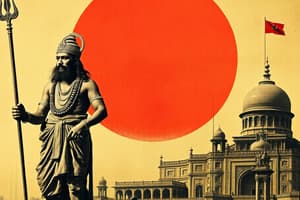Podcast
Questions and Answers
What were the key factors contributing to the Maratha Empire's rapid expansion in the 18th century?
What were the key factors contributing to the Maratha Empire's rapid expansion in the 18th century?
Military victories and peaceful negotiation tactics
How did the Marathas handle their conquest of Delhi in 1737?
How did the Marathas handle their conquest of Delhi in 1737?
Negotiated payment from surrounding regions
What strategy did the Marathas adopt to manage local politics effectively?
What strategy did the Marathas adopt to manage local politics effectively?
Allowed certain regions autonomy under Maratha sovereignty
What event marked a turning point for the Marathas, leading to internal conflicts and eventual decline?
What event marked a turning point for the Marathas, leading to internal conflicts and eventual decline?
What did the Battle of Panipat in 1761 demonstrate about the Marathas?
What did the Battle of Panipat in 1761 demonstrate about the Marathas?
What was the main goal of Shivaji Maharaj when establishing the Maratha Empire?
What was the main goal of Shivaji Maharaj when establishing the Maratha Empire?
Which Maratha ruler accelerated the Empire's expansion trajectory through astute planning and execution?
Which Maratha ruler accelerated the Empire's expansion trajectory through astute planning and execution?
How did Shivaji Maharaj's efforts contribute to the foundation of the Maratha power base?
How did Shivaji Maharaj's efforts contribute to the foundation of the Maratha power base?
What multifaceted strategies were employed by the Maratha Empire for power expansion?
What multifaceted strategies were employed by the Maratha Empire for power expansion?
How did the Marathas manage to coalesce and regain power after being initially fragmented?
How did the Marathas manage to coalesce and regain power after being initially fragmented?
Who were the key regional leaders that guided the strategic expansion of the Maratha Empire?
Who were the key regional leaders that guided the strategic expansion of the Maratha Empire?
What significant precedent did Shivaji Maharaj set for future Maratha policies?
What significant precedent did Shivaji Maharaj set for future Maratha policies?
Flashcards are hidden until you start studying
Study Notes
Introduction
From humble beginnings in the reign of Shivaji Maharaj, the Maratha Empire would grow into a powerful force across the Indian subcontinent through the strategic expansion guided by the Peshwas and other regional leaders like Baji Rao and the four major clans of the Maratha Confederacy. This journey involved multifaceted strategies, including military campaigns, diplomacy, and skillful negotiations among various factions. Let us delve deeper into these key aspects of Maratha power expansion.
Maratha Empire
The Maratha Empire was a multicultural polity spanning most of modern-day India around the time when the British began establishing colonial footholds there. It originated from the kingdom of Maharashtra established by Shivaji Maharaj, who aimed to create a Hindu state separate from Mughal influence. Although initially fragmented, the Marathas coalesced once again under Shanhu, complemented by the power of the Peshwas. This alliance allowed for efficient resource management and coordinated warfare.
Shivaji Maharaj
Shivaji Maharaj laid the foundation stone of the Maratha power base. His efforts were instrumental in laying the groundwork upon which subsequent Maratha kings built their empires. Despite being a crucial figure, his legacy and impact are not always well understood due to some misconceptions regarding his intentions. However, his determination to break away from Mughal domination set a significant precedent for future Maratha policies.
Expansion Strategy
After the demise of Shivaji Maharaj, the Maratha forces regrouped under his successor Shahu. With the assistance of the Peshwas, particularly Baji Rao I, the Marathas expanded their territory exponentially. From controlling just 3 percent of India in the early 18th century, they came to hold approximately 30 percent by mid-century.
This rapid expansion was achieved through a combination of tactics. Military victories secured lands, but peaceful means such as negotiation also played roles. For instance, when the Marathas captured Delhi in 1737, they negotiated payment from surrounding regions rather than imposing direct rule. This approach reflected pragmatism; taking over territories directly might have provoked unnecessary conflict and wasted resources.
Moreover, the Marathas knew how to manage local politics effectively. Instead of pursuing complete control over the empire, they let certain regions enjoy autonomy as long as they paid taxes or accepted Maratha sovereignty. This strategy fostered cooperation instead of resentment, hence avoiding costly rebellions.
Battles of Panipat
One of the critical moments in Maratha history was the Third Battle of Panipat in 1761. During this confrontation, a coalition led by Ahmad Shah Abdali, the Afghan monarch, attempted to check Maratha advances towards the northwest frontier. Fighting against odds, the Marathas suffered a devastating loss at Panipat. This event proved to be a turning point for the Marathas, leading to internal conflicts and eventual decline.
Despite the crushing defeat, the Battle of Panipat serves as a reminder of the Maratha military prowess and their ability to challenge dominant powers both within India and beyond. The decisiveness demonstrated in battles highlighted their capacity for strategic thinking and implementation of bold plans on the field.
Conclusion
The Maratha Empire's expansion can be traced back to a complex interplay of military strength, diplomatic savvy, and shrewd handling of local dynamics. Shivaji Maharaj started it all with his vision for an independent realm, while Baji Rao I accelerated this trajectory with astute planning and execution. Even when faced with adversity, as exemplified by the Battle of Panipat, the Marathas displayed resilience and adaptability, setting examples for posterity.
Studying That Suits You
Use AI to generate personalized quizzes and flashcards to suit your learning preferences.




